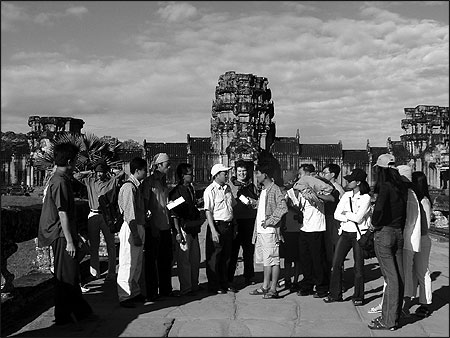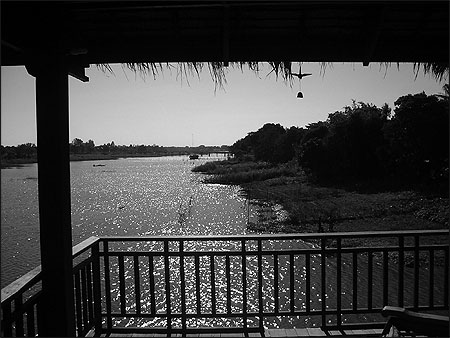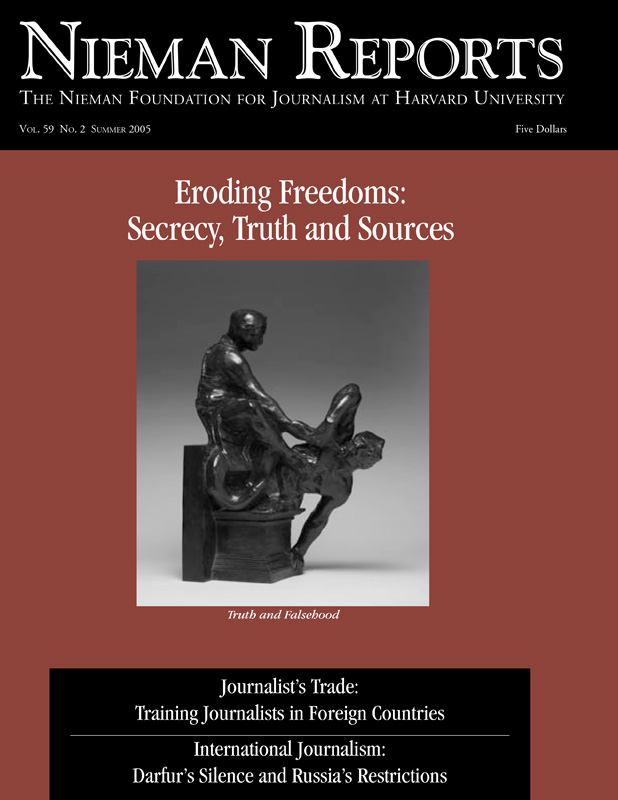
Michele McLellan, center, looks on as students interview a guide at Angkor Wat. The three-month course for Southeast Asian journalists included a visit to the ancient complex of temples. Photo by Bonnie B. Huang.
I don’t remember exactly when I started to feel at home in Cambodia. I didn’t feel that way when I first arrived in Phnom Penh in October 2002 on a teaching assignment when I had to quickly find an apartment without knowing the language or the customs or even what a reasonable rent might be. I didn’t feel at home at the end of stifling hot days when I was covered by a dusty veneer from the city’s mostly unpaved streets. Nor when I tried to negotiate grocery prices at the local and very muddy outdoor market or to read newspaper accounts of meetings of top al-Qaeda operatives in Cambodia for years leading up to 9/11.
When I began to feel at home in my new surroundings was when I met my students—16 young Cambodian, Burmese, Laotian and Vietnamese journalists recruited by the New York-based Independent Journalism Foundation for a three-month journalism course. And when I figured out that the fleets of motos that crowd Phnom Penh’s streets would simply flow around me if I ventured across a road and when I looked across the sunlit Mekong River from the deck at the home of a teaching colleague.
Along the way, I encountered plenty of bumps, including my great teaching challenge—to balance my strong sense of ethical practice with a desire to avoid preaching an “American way” in such a different journalism environment.
I had taught journalism ethics around the United States and in my own newsroom at The Oregonian. I had been the newspaper’s ombudsman and had written The Newspaper Credibility Handbook for the American Society of Newspaper Editors. I emerged from these experiences firmly believing that the ability of journalists to make wellconsidered decisions in the course of their work is central to what we do.
In Cambodia, often I felt whipsawed. My beliefs about journalism—and its ethical practice—held strong, but the context in which it was being practiced was a lot less clear. What could I tell an unemployed Cambodian journalist about bribe taking—a common practice among reporters—when he could barely feed his mother and ailing sister? How could I advise a Burmese reporter to be neutral in writing about the ironfisted military regime in Myanmar? How could I expect that my inimical Vietnamese and Cambodian students would get along when their countries had been enemies for hundreds of years?
Often I responded to these dilemmas by deciding not to express my opinion. Instead, I tried to ask my students questions to help them recognize the implications of unethical practices, such as bribe taking and plagiarism. This approach didn’t always work. Near the end of the term I had to dismiss three students for plagiarism after each had copied entire stories. One of them ended up getting a better job with a Phnom Pehn television station. (She did not list me among her references.) Another returned to his job in Laos, and I never learn what happened to the third. My sense is that none of them took away much from the class other than upset at their dismissals. But these were unpleasant, heart-wrenching moments for me, in part because the dismissals came even after I’d lowered my standards in the face of the circumstances that these students brought with them. I’d given each of them three strikes while, two years earlier in my own newsroom, I had recommended letting go a longtime employee for lifting a few phrases.
There were also many joys. I still smile when I think of the day when I took my Burmese student to a cramped Internet café to set up his first international Web connection and an e-mail account. I still get e-mails occasionally from him with stories he has written for an antiregime newspaper near the Burmese border in Thailand. And I took my feuding Vietnamese and Cambodian students to write about Wat Champa, a tiny village where Vietnamese and Cambodians live side-by-side. When they had to ask each other for translating help, they started to get along. There was gratification, too, when I saw my students, despite feeling very intimidated, interviewing officials of their governments at a regional conference on malaria.
Students who completed the class are in touch occasionally. Two of my Vietnamese students have written to let me know they are using interviewing and writing techniques that I shared with them. My Burmese student, despite his opinionated rhetoric in class, seems to be writing fairly neutral news and features. One of my Khmer students who thought he wanted to be a teacher has doggedly stayed with freelance writing despite family disapproval and a bleak job market.
Leaving, To Return Again
After three months, I left Cambodia, looking forward to visiting friends in Bangkok, New Delhi and then a couple of months in Eastern Europe, which I had not visited since 1968. After spending a few days in Bangkok, a Thai friend dropped me at the airport to head to India. A Cambodian travel agent had made the reservation and told me I would get my Indian visa on arrival. Instead I found that my reservation had not been confirmed and that I needed to get the visa in advance. It was Friday night. I was looking at a weekend and then at least three more days to get the visa.
Staying in Bangkok was the obvious choice, but I found myself asking whether there was a late flight to Phnom Penh, where I thought I might stay a few days with an American friend. When I arrived, my friend was gone for the weekend, but the caretaker smiled and let me in.
In returning, I felt at home. On the street, Western tourists asked me for directions, and I found I could tell them where to go. My visit surprised and delighted Cambodian friends who thought I was gone, probably for good. At first, I thought I’d stay only long enough to get a visa for India. Instead, I stayed for another three months, leaving only after I’d been offered a once-in-a-lifetime job in the United States.
But Cambodia wasn’t done with me. The feeling of being at home there would stick with me. The love of the communal and friendly culture drew me back. The transformation to knowing I could make a life as a stranger in a strange land hooked me. Now I was more willing to take risks, to enter a different flow.
And that brings me to the house on the Mekong River. Fast forward to December 2003. A teaching engagement in Kyoto, Japan enabled me to spend a week in Phnom Penh. One night, after an evening of much laughter and wine with an Australian colleague and Cambodian friends, I turned to a Cambodian friend and said: “Will you start looking for some land?”
The next day, this friend, Ses Chanrong (a.k.a. “Bo”), picked me up at my hotel. He looked me in the eye and asked, “Did you mean it or was it the wine?” It probably was the wine the night before. But in that split second that morning I knew I meant it as well.
Two months later, Bo e-mailed that he had found a piece of land right up the road from Peter Starr, my Australian friend. It is a deep, narrow strip of land that fronts on the main road through a small farming village south of Phnom Penh. The lot backs onto the Mekong. It has nine mango trees, and Bo brought three geese to live on the property.
Last December, I returned to Cambodia for three weeks, to see the land, hire a caretaker (who will live on the property with his wife and two small children) and to approve plans for a very tiny wood house with a very large deck. I am a curiosity to the neighbors, and I know that will pass.
In March, Bo e-mailed that the house is finished. Photos of it arrived in April. How often will I go there? Right now, I’m not sure. I have a full-time job, an interesting career, and a newsroom training project about which I am passionate. But when I do go back, I know this: I will be home.

McLellan’s house site on the Mekong River. Photo by Michele McLellan.
Michele McLellan, a 2002 Nieman Fellow, directs Tomorrow’s Workforce, a newsroom training program that links strategic investment in professional development with improving the value and appeal of quality journalism. More information about this program can be found at www.tomorrowswork.org.



